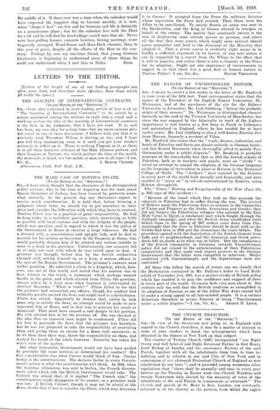THE HARD CASE OF PONTIUS PILATE.
[To THE EDITOR OF THE " SPECFATOR."] have often thought that the character of the distinguished public servant, who in the time of Augustus was for some years Roman Governor of Judaea, has been treated by posterity some- what unfairly. At the present day our Governors expect to receive much consideration. It is held that, before forming a judgment about them, we should try to put ourselves in their place and consider the difficulties with which they have to contend. Pontius Pilate was in a position of great responsibility. He had to keep order in a turbulent province, while interfering as little as possible with local customs and with the religion of the people, which was peculiar, and in regard to which it was the policy of the Government at Rome to exercise a large tolerance. He had a devoted wife, a conscientious and upright lady, and he had to account for his actions as Governor to the Emperor at Rome, who would probably dismiss him if he allowed any serious trouble to some to a head in his province. Unfortunately, our accounts tell us of only one case with which he was called upon to deal. A prisoner was brought before him by the Jewish authorities charged with setting himself up as a king, a serious offence in the eyes of the Roman Government. The prisoner's answers were rather puzzling. He admitted a claim to a kingship, which, how- ever, was not of this world, and stated that his mission was to bear witness to the truth, a statement which perhaps seemed hardly to the point, and which elicited from Pilate the question, always asked by a busy man when business is interrupted by abstract theorems, " What is truth? " Pilate failed to see that the prisoner had committed any offence, though his conduct had evidently greatly excited the Jews and might lead to a disturbance. Pilate was afraid. Apparently he foresaw that, unless he took some step to satisfy the Jews, an attempt would •be made to mis- represent him at Rome, and in that way to procure his recall or dismissal. That must have seemed a real danger to his position. His wife advised him to let the prisoner off. She was shocked at the idea that an innocent man might be condemned. Pilate did his best •to persuade the Jews that the prisoner was harmless, but he was not prepared to take the responsibility of overruling them and giving them an excuse for a -home rule movement, so he let them have their way, threw the responsibility on them, and washed his hands of the whole business. Posterity has taken his wife's view of the matter.
But what responsible Government would not have been guided by precisely the same motives as determined his conduct? His first consideration was what Caesar would think of him. Caesar to-day is the constituencies. The decisive factor in every Govern- ment's action is what the constituencies will think. In 1914, when the Austrian ultimatum was sent to Serbia, the French Govern- ment asked which side the British Government would take. The Cabinet was afraid that, if it replied " The French side," the constituencies might disapprove of its answer, so a priceless week was lost. A British Cabinet, though it may not be afraid of the Jews, thinks that it has to consider the Press, which may denounce it to Caesar. It accepted from the Press the military dictator whose reputation the Press had created. Then there were the Allies to be conciliated. To satisfy Russia an army was sent to the Dardanelles, and the King of Greece allowed to intrigue in behalf of the enemy. The motive that constantly recurs is the fear of displeasing some outside person or persons, and above all -the fear that some course which might seem natural should prove unpopular and lead to the dismissal of the Ministry that adopted it. That a given course is evidently right seems to be hardly a sufficient argument in its favour, at any rate unless it can be supported by a renort from the Whips to the effect that it will be popular, and unless there is also a clamour in the Press for its adoption. Ought not our experience of Governments to suggest to us that there was a good deal of human nature in


























 Previous page
Previous page